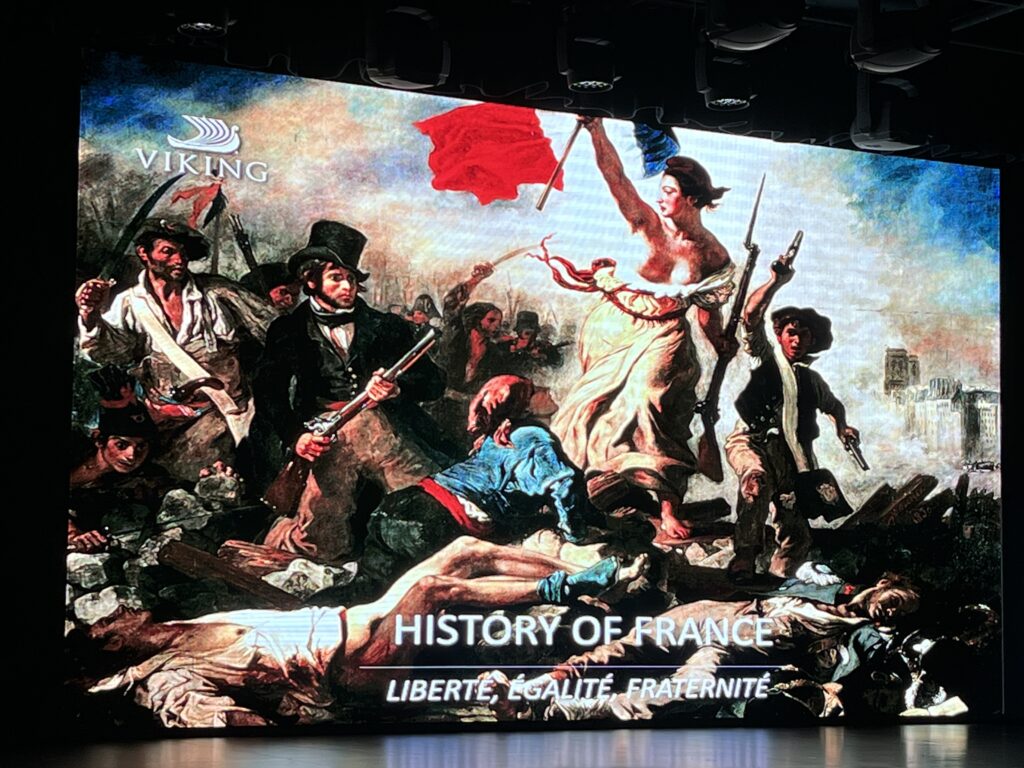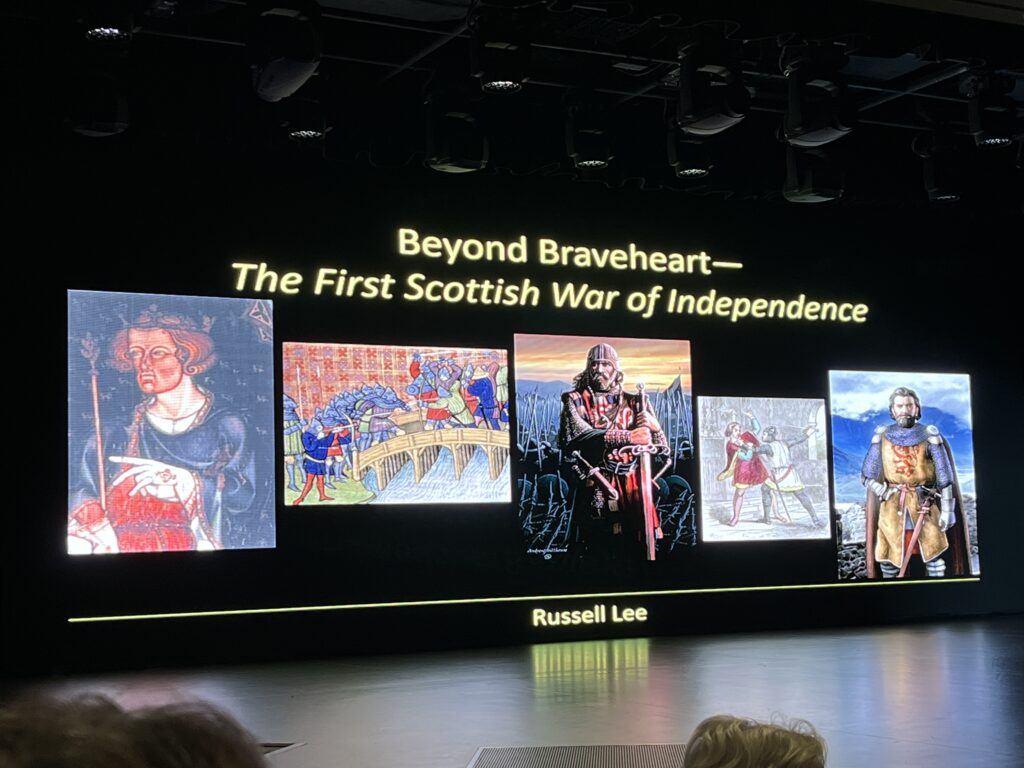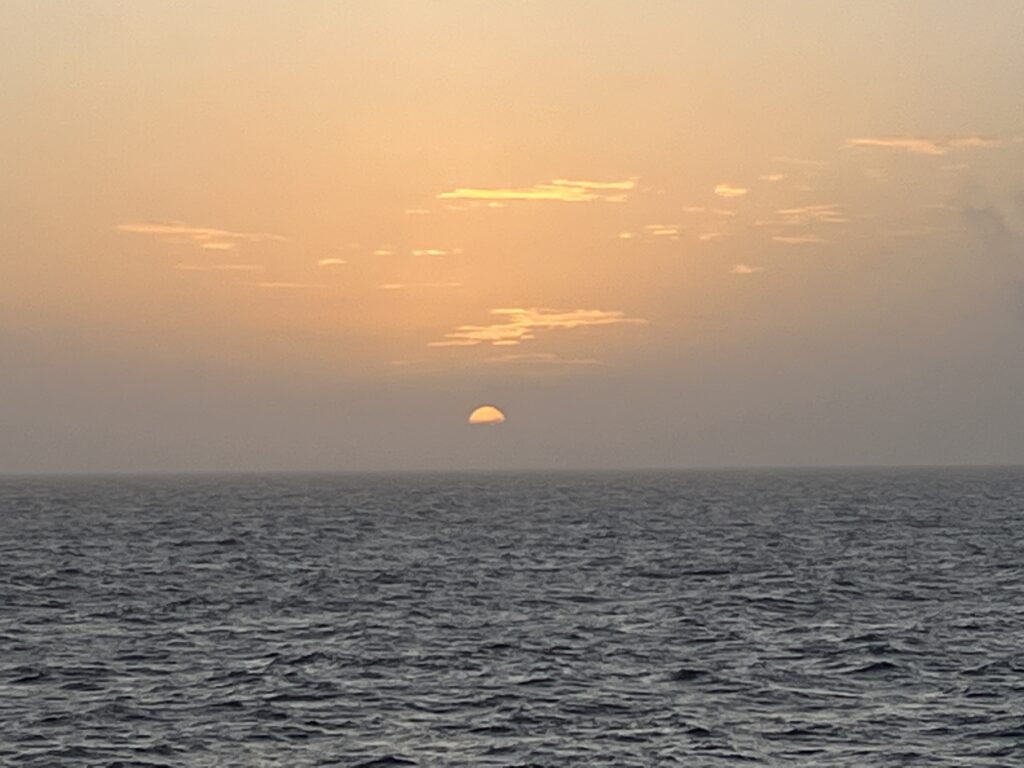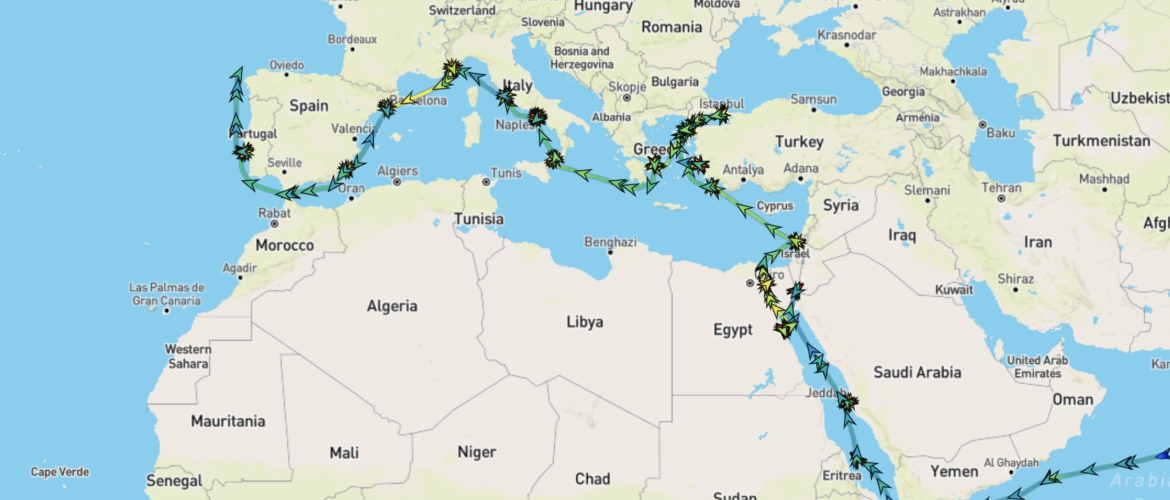Noon Report:
- Location: N 43° 40.43′, W 009° 26.88′
- Speed: 16 knots
- Course: 23º
- Weather: High Thin Clouds
- Temperature: 15º C; 59º F
- Wind: SW 20 knots; 23 mph
- Sea: 8′ swell
The day started with a somewhat rocky walk on the deck. Our corse is basically NNE and the wind is driving 8′ swell out of the SW so one is never exactly sure where the deck will be when one takes a step.
While I was doing that Cheryl joined some friends down in the spa soaking up the warmth in the warm pool. (C – With the bubbles going, the strong jet currents, and the repetitive high tide effect of the tilting boat, I occasionally felt about to wash away!)
Following breakfast we headed down to the Theater for one of Caroline Malloy’s famous “45,000 years of history in 45 minutes” lectures (C – she’s VERY energetic so it’s rather a romp through history).

She never makes it all the way, or even to her goal date (today she was trying to get to the French Revolution) but she’s a very enthusiastic and entertaining lecturer and we do gain a lot of information from her talks.
Following her lecture we kept our seats as the Theater filled up for the return of our favorite lecturer, Russell Lee! He and his wife Gail were scheduled to fly to Italy for the maiden voyage of the next ship – the Viking Saturn, but when the offer came to join us for the last week of our cruise they made the wise choice.
Today his lecture was about the struggle for Scottish independence and where the movie “Braveheart” was inaccurate.

There was no noon trivia today so we returned to the room where Cheryl worked on yesterday’s blog- then decamped to the warmth of the pool deck-while I read over reports for my meetings this evening.
At 4:15 I turned in our passports (for processing by the French authorities – I know, we’ve been in the EU for more than a week, but ‘their house, their rules’.)
Then at 5:00 I logged on to Zoom for the first of two meetings this evening. At 6:00 pm a waiter arrived with our room service meals (one of the advantages of Zoom – Turn off your camera, mute your microphone, and you can chow down while the meeting goes on.) The first meeting ended at about 7:30 and I snapped a sunset pic before we headed upstairs for BBB (15/19 – but only good enough for 4th place). (Q: Does the North Pole have it’s own time zone? A: No)

At 9:00 pm I was back on Zoom for another 3 hour meeting. However, this was a time change night – losing an hour – so it was actually 1:00 am when I got to bed.
Tomorrow is our last sea day before 3 port days and the travel home day – a test of endurance.
There’s been a suggestion that we might do a bit of “practice” packing to make sure it all fits. Whoopee!
Till then,
R
Cheryl’s Factoids:
- EARLY HISTORY OF FRANCE – In the Stone Age prehistoric people traveled west across Europe and down the Iberian peninsula. Cave art has been discovered dating anywhere back from 35,000 BC. In the Iron Age people crossed the Strait of Gibraltar up from Africa and traveled north, further settling in the peninsula. Adventurous Phoenicians arrived and settled, then Greeks, then for 609 years the Romans ruled the area with over 500 different tribal groups in various regions. Julius Caesar said Gaul was divided into 3 parts: Gauls (the Celts), Belgae (Belgium), and Aquitania (Basque region next to Spain). After the fall of the Roman Empire, it was conquered by a Germanic tribe known as the Franks (Its present name is derived from the Latin Francia, meaning “country of the Franks”). The various areas were united under the Frankish leader, Clovis I, who became the first king of France in the late 5th century. In 732 AD at the Battle of Poitiers, Charles Martel turned back the Muslims (who had conquered their way across Western Asia and Constantinople, then along the top of Africa, and now were headed into Europe). His son, Pippin, is recognized as the first Frankish king approved of by the Pope. Pippin’s son was Charlemagne. Charlemagne expanded the Frankish Kingdom through military conquests, including a campaign into Italy to assist the Pope against his enemies. In appreciation for Charlemagne’s support, the Pope crowned him “Emperor of the Romans” in 800 AD (he now controlled all of France, Germany and most of Italy). When the Holy Roman Emperor, Philip IV of France started going bankrupt, he imposed a tax on the churches. The Pope threatened to excommunicate him and all his people. That Pope died and a crises in the papacy went on for 11 months. Finally Philip IV ensured (French-born) Pope Clement’s election by the conclave and pressed the Pope to move to Avignon. (From 1309 to 1377 AD, the seat of the papacy resided in Avignon, France, rather than Rome. Pope Gregory XI returned to Rome in 1377, thus ending the Avignon Papacy aka The Babylonian Captivity, at which point Romans rioted to ensure the election of a Roman for pope.) Still needing more money, Philip IV then went after the Knights Templar trying to tax them. The Templars refused and Philip started killing them all off-resulting with the head of the order at his death, pronouncing a curse upon Philip and within 40 days Philip was dead. In 1328, Edward III of England claimed the throne of France after the death of his uncle Charles IV of France. At the time of Charles IV’s death, Edward was his nearest male relative through Edward’s mother Isabella of France but the French said there was no precedent for someone succeeding to the French throne based on his maternal ancestry-this led to the 100 years war. During this war, Joan of Arc (18 years old) led the French army to victory over the English at Orléans. Captured a year later, Joan was burned at the stake as a heretic by the English and their French collaborators. She was canonized as a Roman Catholic saint more than 500 years later.
- By 885 AD, Viking raiders (“Norse Men/ Norman) began raiding then settling in northern France. After being defeated by the Franks, the French king gave the area of present-day Upper Normandy to the Norsemen. They adopted the French culture, language, and religion. In 1066, with the Norman Conquest, Normandy French kings started their reign over Britain.
